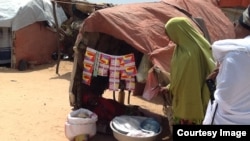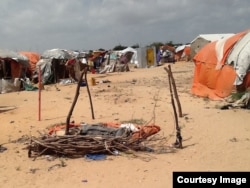Although he has never lived there, Sahnun Mohamud has always wanted to help Somalia, the birthplace of his parents and home to many of his relatives.
Now a college student, he believes educating as many Somali children as possible is essential to making a difference and building a better future for the war-torn east-African coastal nation.
Mohamud, 21, is following in his mother’s footsteps.
“She’s been helping Somalia since before I was born,” he said.
In 1987, his mother, Filsan Darman co-founded a non-profit organization called Aadamiga, which means humanitarian in Somali.
“At that time we were helping women," Darman said. "There was a civil war in Somalia. We were helping those people who escaped from the north of Somalia to Mogadishu because the civil war started there. So we were helping them with food and clothes also.”
Inspired and encouraged by his mother, Mohamud got involved early on in various charitable projects. His latest effort is founding Students for Somalia, a group of college students committed to raising money to fund projects in the country.
“I noticed that a lot of the Somali movements and organizations that were currently existing were really exclusive, only Somalis," he said. "So my group and my whole motto has been let’s let every ethnicity and race help Somalia. I think it's a huge resource to have non-somali people helping Somalia.”
Joint project
This year, Students for Somalia and Aadamiga are collaborating on a joint project to fight poverty and promote education at the same time.
“We give some money to a female Somali entrepreneur who has a kid attending a school in Somalia," said Mohamud. "That female entrepreneur eventually has to pay back the money, but rather than to pay back to us, she pays it back to the school for improvements on the school. So it’s really about education and keeping kids in school.”
Mohamud says Students for Somalia is focusing on education because it is a long-term solution to most of the country’s current problems. He believes providing a monetary incentive for mothers to expand their business while keeping their children in school - a condition of the loan - will prevent this generation from dropping out to work or be recruited by warlords as soldiers.
Darman is now in Mogadishu to help get the program started.
Micro loans
The entrepreneur mothers who will receive the micro loans have been living for years in IDP camps for internally displaced people in the capital.
“If you come to the IDP camps, you’ll see that some of the ladies, even though they live in shacks, right in front of their shacks, they have like a little store, selling stuff like basically daily necessities like food," Darman said. "The camp that we’re targeting right now has 920 families. Of course we can’t help all of them. We’re just trying to help at the most probably 20 women at the beginning. We’re trying to empower them, give them a little bit of something to expand their business.”
Although it is a small amount of money, ranging from $100 and $500, Darman insists the loans will make a difference.
“You have to always think positive," she said. "Even though it's 10, 20, 30 [women], at least we’re helping people and that will alleviate a lot of poverty.”
Educational opportunities
The project has another long-term goal: improving educational opportunities for Somali children.
“The most important job we're doing right here is education, because we believe that without education no nation can succeed," she said. "So we’re trying to establish schools that are free.”
“We raised almost $7,000 to start a school in Somalia so the kids will go through their K to 12 [kindergarten through grade 12] education and hopefully go to college,” Mohamud said.
Mother and son hope their program will help displaced families leave the camps and move to safer areas, which is the first step toward establishing stable, productive lives.
Now a college student, he believes educating as many Somali children as possible is essential to making a difference and building a better future for the war-torn east-African coastal nation.
Mohamud, 21, is following in his mother’s footsteps.
“She’s been helping Somalia since before I was born,” he said.
In 1987, his mother, Filsan Darman co-founded a non-profit organization called Aadamiga, which means humanitarian in Somali.
“At that time we were helping women," Darman said. "There was a civil war in Somalia. We were helping those people who escaped from the north of Somalia to Mogadishu because the civil war started there. So we were helping them with food and clothes also.”
Inspired and encouraged by his mother, Mohamud got involved early on in various charitable projects. His latest effort is founding Students for Somalia, a group of college students committed to raising money to fund projects in the country.
“I noticed that a lot of the Somali movements and organizations that were currently existing were really exclusive, only Somalis," he said. "So my group and my whole motto has been let’s let every ethnicity and race help Somalia. I think it's a huge resource to have non-somali people helping Somalia.”
Joint project
This year, Students for Somalia and Aadamiga are collaborating on a joint project to fight poverty and promote education at the same time.
“We give some money to a female Somali entrepreneur who has a kid attending a school in Somalia," said Mohamud. "That female entrepreneur eventually has to pay back the money, but rather than to pay back to us, she pays it back to the school for improvements on the school. So it’s really about education and keeping kids in school.”
Mohamud says Students for Somalia is focusing on education because it is a long-term solution to most of the country’s current problems. He believes providing a monetary incentive for mothers to expand their business while keeping their children in school - a condition of the loan - will prevent this generation from dropping out to work or be recruited by warlords as soldiers.
Darman is now in Mogadishu to help get the program started.
Micro loans
The entrepreneur mothers who will receive the micro loans have been living for years in IDP camps for internally displaced people in the capital.
“If you come to the IDP camps, you’ll see that some of the ladies, even though they live in shacks, right in front of their shacks, they have like a little store, selling stuff like basically daily necessities like food," Darman said. "The camp that we’re targeting right now has 920 families. Of course we can’t help all of them. We’re just trying to help at the most probably 20 women at the beginning. We’re trying to empower them, give them a little bit of something to expand their business.”
Although it is a small amount of money, ranging from $100 and $500, Darman insists the loans will make a difference.
“You have to always think positive," she said. "Even though it's 10, 20, 30 [women], at least we’re helping people and that will alleviate a lot of poverty.”
Educational opportunities
The project has another long-term goal: improving educational opportunities for Somali children.
“The most important job we're doing right here is education, because we believe that without education no nation can succeed," she said. "So we’re trying to establish schools that are free.”
“We raised almost $7,000 to start a school in Somalia so the kids will go through their K to 12 [kindergarten through grade 12] education and hopefully go to college,” Mohamud said.
Mother and son hope their program will help displaced families leave the camps and move to safer areas, which is the first step toward establishing stable, productive lives.












